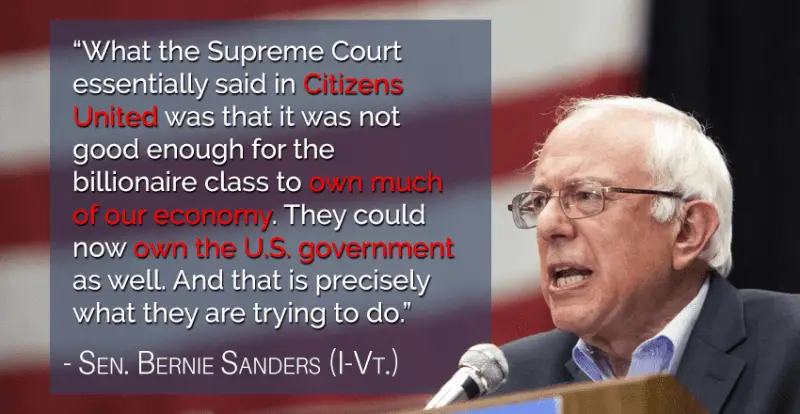April 3rd, 2017
Contributing writer for Wake Up World
“If there was one decision I would overrule, it would be Citizens United. I think the notion that we have all the democracy that money can buy strays so far from what our democracy is supposed to be.” ~ Supreme Court Justice Ruth Bader Ginsburg
The 2010 decision regarding Citizens United v. Federal Election Commission is one of the most controversial Supreme Court ruling of all time. Striking down limits for corporate and union campaign expenditures, the case was decided 5-4 and has set a president for the spending of unlimited sums on ads and various other political tools by corporations, labor unions and the wealthy.
There’s one catch: it has to happen independently of a candidate or party. On the surface, this stipulation appears to be a safeguard against massive amounts of money swaying elections. However, the reality is much different. Instead, money is funneled through super PACs, which are only slightly removed from the candidates they support. Campaigns are still considered ‘legal’ — as far as the ruling is concerned — but now are flush with cash from corporate, union and private donors who maintain their own agendas. A win-win — for politicians and their donors, at least. The rest of us lose.
“Forty-five percent of all super PAC funds spent in the 2014 election cycle came from groups dedicated to a single candidate or party, and over one-third of total outside spending came from just eight party-aligned groups.” [source]
As if this wasn’t bad enough, another negative effect of the ruling is that a large portion of the funding doesn’t have to be publicly disclosed, thereby creating a wave of “dark money” without any accountability whatsoever.
Writes Katie Rose Quandt in How is Citizens United Ruining Democracy and How Can We Stop It?:
“[Sixty] percent of super PAC money spent on all federal elections since 2010 – $600 million of $1 billion – came from just 195 individuals and their spouses.
“Undisclosed donations are also on the rise. This election cycle, dark money made up 28 percent of all spending in competitive Senate races. The winners of the 11 closest races benefited from $131 million in dark money, $23 million of which was behind Sen. Thom Tillis (R-NC).”
Ian Vandewalker of the Brennan Center For Justice notes:
“The public doesn’t know who spent that money … Does Thom Tillis know who spent that money? Is he going to give legislative favors to the people who spent that money? We don’t know and we can’t know. And the voters won’t be able to hold him accountable at the ballot box six years from now if he does.”
As you can see, the ruling of Citizen’s United is clearly problematic for fair and democratic elections. The question is: what do we do about it?
The Power of Patience and Taking the Fight Local
Constitutional change is no easy feat, which, in and of itself isn’t bad — it actually helps protect the integrity of the document. So while we may hope for a sweeping constitutional amendment overturning Citizens United — if history is any indicator —we would have better success looking elsewhere to change the ruling. Typically, constitutional law is modified through a long process of small steps — and usually at the state level.
If we truly want to fix the massive problem of money in politics, it won’t begin at the Supreme Court or in Washington DC, but rather locally. The success of gun-rights and marriage-equality are two perfect examples of how to approach election finance reform.
In both cases, advocates began their campaigns in states that were most likely to be sympathetic to their cause — for the National Riffle Association (NRA) it was Florida, while marriage-equality activists focused on Massachusetts and Vermont. The NRA actively campaigned for broadening provisions for gun rights in state constitutions, as well as pushing for the right to carry concealed weapons and laws that protected gun manufacturers from liability. Gay-rights advocates took up the torch for parental rights, nondiscrimination legislation and domestic-partnership benefits.
“By the time the Supreme Court recognized a right to bear arms, most state constitutions had already done so, and by the time the Court declared that gay and lesbian couples had a federal right to marry, 37 states and the District of Columbia had recognized same-sex marriage.” [source]
Campaign-finance reform is making headway in a similar fashion. Several states and cities — including Maine, Connecticut, Arizona, Seattle and New York City — have embraced innovative public-financing schemes to undermine the influence wealth has over elections. New York City matches small donations six-to-one for candidates that adhear to contribution and spending limits. Maine gives a public grant to those running for office “who raise a qualifying number of $5 donations and then agree to abstain from further private fund-raising.” State representative candidates in Connecticut have their small donations matched up to a ratio of 9-1 when they raise a minimum level of funds. And last year Seattle passed an initiative that provides $25 “democracy vouchers” to voters, which are to be distributed however they wish to candidates who agree to spending limits.
Writes David Cole in The Atlantic:
“By amplifying the contributions of ordinary citizens, reducing candidates’ reliance on Big Money, and enticing candidates to accept voluntary limits on their spending, these laws are meant to encourage politicians to pay attention to all their constituents, not just the wealthy ones. And by making realistic amounts of public financing available, the reforms have made it possible for a wider range of candidates—including, so far, waitresses, teachers, and a convenience-store clerk — to run for office and win.”
In fact, nearly 300 publicly financed state candidates were elected by voters in Connecticut, Maine and Arizona alone. Connecticut State Rep. Matt Lesser (D-Middletown) believes that publicaly financed elections are better for everyone — incumbents, challengers and the people they represent.
“Not only does the system curb the influence of the rich and well-connected, but forcing politicians to ask regular constituents for small donations “really reminds us who we work for, who we’re supposed to represent.”’ [source]
If you would like to learn more about simple steps each of us can take today to curb the influence money has over politicians, have a look at the article, 5 Ways You Can Fight Citizens United — The Story of Citizens United v FEC: How We The People Can Reclaim Our Democracy.
The Story of Citizens United v. FEC (2011)
Additional reading:
- Fed Up With Money Influencing Politicians? Here’s How We Can Fight Back
- Tired of Our Bought-and-Paid-For Congress? This 18-Year-Old Created an App That Exposes Sellout Politicians
- Politicians in California May Soon be Forced to Wear Corporate Sponsor Patches Like Nascar Drivers
Article sources:
- www.yesmagazine.org/…/5-ways-you-can-fight-citizens-united
- www.billmoyers.com/./five-years-citizens-united
- www.newrepublic.com/…/ruth-bader-ginsburg-interview-retirement-feminists-jazzercise
- www.theatlantic.com/…/how-to-reverse-citizens-united/471504
- www.publicintegrity.org/…/citizens-united-decision-and-why-it-matters
- www.truth-out.org/…the-supreme-court-supplied-a-blueprint-to-overcome-citizens-united-we-just-need-to-use-it
Recommended articles by Carolanne Wright:
- How Pornography and the Sexualization of Children are Distorting Our Kids’ Perceptions
- Fukushima Nightmare is Far From Over — Radiation Levels Have Just Hit a Record High
- Psychiatric Industry Corruption: 6-Year-Old Boy Committed to a Psych Ward for Throwing a Temper Tantrum at School
- Renowned Harvard Psychologist Says ADHD is Largely a Fraud
- Plastic-Eating Mushroom Discovered in the Amazon Rainforest — A Solution for Our Trash Saturated World?
- Over 100 Scientific Studies Agree: Cannabis Annihilates Cancer
- Why Every Parent Should Consider Unschooling
- First U.S. City Produces More Electricity Than It Uses — With 100% Renewable Technology
- If You Care About Animals and the Earth, Here’s Why You Need to Boycott Palm Oil Immediately
- Brain Waves and Binaural Beats: A Gateway to Higher Consciousness, Enhanced Learning and Brain Function
- 85% of Tampons, Pads and Other Feminine Care Products Contaminated with Monsanto’s Cancer-Causing Glyphosate
- Latest Research on CBD Oil Offers New Hope for Healing Leaky Gut Syndrome and Autoimmune Disorders
About the author:
I’m Carolanne — a writer, chef, traveler and enthusiastic advocate for sustainability, organics and joyful living. It’s good to have you here. If you would like to learn more, connect with me at Thrive-Living.net or visit Twitter.com/Thrive_Living.
If you've ever found value in our articles, we'd greatly appreciate your support by purchasing Mindful Meditation Techniques for Kids - A Practical Guide for Adults to Empower Kids with the Gift of Inner Peace and Resilience for Life.
In the spirit of mindfulness, we encourage you to choose the paperback version. Delve into its pages away from screen glare and notifications, allowing yourself to fully immerse in the transformative practices within. The physical book enriches the learning process and serves as a tangible commitment to mindfulness, easily shared among family and friends.
Over the past few years, Wake Up World has faced significant online censorship, impacting our financial ability to stay online. Instead of soliciting donations, we're exploring win-win solutions with our readers to remain financially viable. Moving into book publishing, we hope to secure ongoing funds to continue our mission. With over 8,500 articles published in the past 13 years, we are committed to keeping our content free and accessible to everyone, without resorting to a paywall.










